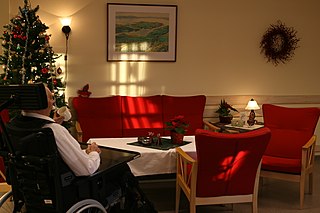Related Research Articles
The disability rights movement is a global social movement that seeks to secure equal opportunities and equal rights for all people with disabilities.

A halfway house is an institute for people with criminal backgrounds or substance use problems to learn the necessary skills to re-integrate into society and better support and care for themselves.
The Commission on Accreditation of Rehabilitation Facilities (CARF) is an international, non-profit organization founded in 1966 with the assistance of Mary E. Switzer, then U.S. Social and Rehabilitation Services commissioner. For some institutions, it represents an alternative to Joint Commission certification. Revenue sources include contributions from the International Advisory Council, which comprises entities being accredited.
Developmental disability is a diverse group of chronic conditions, comprising mental or physical impairments that arise before adulthood. Developmental disabilities cause individuals living with them many difficulties in certain areas of life, especially in "language, mobility, learning, self-help, and independent living". Developmental disabilities can be detected early on and persist throughout an individual's lifespan. Developmental disability that affects all areas of a child's development is sometimes referred to as global developmental delay.

Long-term care (LTC) is a variety of services which help meet both the medical and non-medical needs of people with a chronic illness or disability who cannot care for themselves for long periods. Long-term care is focused on individualized and coordinated services that promote independence, maximize patients' quality of life, and meet patients' needs over a period of time.
The Lanterman Developmental Disabilities Act, also known as the Lanterman Act, is a California law that was initially proposed by Assembly member Frank D. Lanterman in 1973 and passed in 1977 and gives people with developmental disabilities the right to services and supports that enable them to live a more independent and normal life.

Deinstitutionalisation is the process of replacing long-stay psychiatric hospitals with less isolated community mental health services for those diagnosed with a mental disorder or developmental disability. In the late 20th century, it led to the closure of many psychiatric hospitals, as patients were increasingly cared for at home, in halfway houses and clinics, in regular hospitals, or not at all.
A mental health professional is a health care practitioner or social and human services provider who offers services for the purpose of improving an individual's mental health or to treat mental disorders. This broad category was developed as a name for community personnel who worked in the new community mental health agencies begun in the 1970s to assist individuals moving from state hospitals, to prevent admissions, and to provide support in homes, jobs, education, and community. These individuals were the forefront brigade to develop the community programs, which today may be referred to by names such as supported housing, psychiatric rehabilitation, supported or transitional employment, sheltered workshops, supported education, daily living skills, affirmative industries, dual diagnosis treatment, individual and family psychoeducation, adult day care, foster care, family services and mental health counseling.
A group home, congregate living facility, care home, adult family home, etc., is a structured and supervised residence model that provides assisted living and medical care for those with complex health needs. Traditionally, the model has been used for children or young people who cannot live with their families or afford their own homes, people with chronic disabilities who may be adults or seniors, or people with dementia and related aged illnesses. Typically, there are no more than six residents, and there is at least one trained caregiver there 24 hours a day. In some early "model programs", a house manager, night manager, weekend activity coordinator, and four part-time skill teachers were reported. Originally, the term group home referred to homes of 8 to 16 individuals, which was a state-mandated size during deinstitutionalization. Residential nursing facilities, also included in this article, may be as large as 100 individuals in 2015, which is no longer the case in fields such as intellectual and developmental disabilities. Depending on the severity of the condition requiring one to need to live in a group home, some clients are able to attend day programs and most clients are able to live normal lifestyles.
Texas state supported living centers are a collection of residential facilities run by the state for people with intellectual disabilities in Texas, United States. The schools, operated by the Texas Health and Human Services Commission operate under the Federal Intermediate Care Facilities for Individuals with Intellectual Disabilities (ICF/IID) program.

The Utah State Hospital (USH) is a mental hospital located in eastern Provo, Utah. The current superintendent is Dallas Earnshaw.

The Arkansas Department of Human Services (DHS) is a state agency of Arkansas, headquartered in Donaghey Plaza South of the Donaghey Complex, a five-story building on the southwest corner of Main Street and 7th Street, in Little Rock.
Alabama Department of Mental Health is the state agency responsible for serving Alabama citizens with mental illnesses, intellectual disabilities, and substance use disorders. The department was formally established by ACT 881 in 1965.
Intermediate Care Facilities for Individuals with Intellectual Disabilities (ICF/IID), formerly known as Intermediate Care Facilities for Mental Retardation (ICF/MR), is an American Medicaid-funded institutional long-term support and service (LTSS) for people with intellectual disabilities or related conditions. Section 1905(d) of the Social Security Act enacted benefits and made funding available for "institutions" for individuals with intellectual or related conditions. According to federal law 42 CFR § 440.150 the purpose of ICD/IIDs is to "furnish health or rehabilitative services to persons with Intellectual Disability or persons with related conditions."

The Department of Mental Hygiene (DMH) is an agency of the New York state government composed of three autonomous offices:
This disability rights timeline lists events relating to the civil rights of people with disabilities in the United States of America, including court decisions, the passage of legislation, activists' actions, significant abuses of people with disabilities, and the founding of various organizations. Although the disability rights movement itself began in the 1960s, advocacy for the rights of people with disabilities started much earlier and continues to the present.

The state of North Carolina is undertaking a comprehensive policy shift on how the government budgets for and manages resources for mental health, developmental disability, and substance abuse services. The 1915 (b)(c) Medicaid Waiver Program was chosen by the North Carolina Department of Health & Human Services, Division of Medical Assistance as a way to control and more accurately budget for the rising costs of Medicaid funded services. The 1915 (b)(c) Waiver Program was initially implemented at one pilot site in 2005 and evaluated for several years. Two expansion sites were then added in 2012. Full statewide implementation is expected by July 1, 2013.
The New York State Office for People With Developmental Disabilities (OPWDD) is an executive agency in the state of New York, whose mission is to provide services and conduct research for those with intellectual disabilities and developmental disabilities (I/DD). It is one of New York State’s largest agencies, with a mandate to provide services and supports to more than 130,000 people with intellectual or developmental disabilities and leads a workforce of more than 22,000 direct support staff, clinicians, nurses, researchers and other professionals throughout the state. It operates 13 Developmental Disabilities Services Offices which operate group homes for the individuals with intellectual and developmental disabilities in its care. Prior to July 2010, the agency was named the Office of Mental Retardation and Developmental Disabilities.
Howard Center is a Burlington, Vermont-based nonprofit organization that offers professional crisis and counseling services to children and adults; supportive services to individuals with autism and developmental disabilities who need help with education, employment, and life maintenance skills; counseling and medical services for those struggling with substance use disorders; and interventions and supports for adults with serious and persistent mental health challenges in Chittenden County, Vermont's most populous county. Howard Center collaborates with many community partners and is a United Way of Northwest Vermont-funded agency.
William D. Partlow Developmental Center, also known as the Partlow State School and Hospital, was a state school for people with mental disabilities, primarily intellectual and developmental disabilities in Tuscaloosa, Alabama, USA. It was operated by the Alabama Department of Mental Health. It was the last such full-sized facility operated by the State of Alabama and closed in 2011.
References
- ↑ "Facilities". Virginia Department of Behavioral Health and Developmental Services. Retrieved 2024-05-30.
{{cite web}}: CS1 maint: url-status (link) - ↑ "SEVTC | DBHDS – Southeastern Virginia Training Center" . Retrieved 2024-05-30.
- ↑ "HWDMC | DBHDS – Hiram W. Davis Medical Center" . Retrieved 2024-05-30.
- ↑ "VCBR | DBHDS – The Virginia Center for Behavioral Rehabilitation" . Retrieved 2024-05-30.
- ↑ "Home / Virginia Department of Behavioral Health and Developmental Services". www.dbhds.virginia.gov.
- 1 2 MCKELWAY, BILL. "Mental health officials are sued:Va. agency refuses to detail patient's death, suit alleges." Richmond Times Dispatch, 8 December 2007
